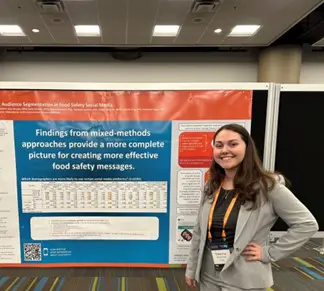Deanna Amarosa

As a recent participant in the Centers for Disease Control and Prevention (CDC) Health Communication Fellowship, Deanna Amarosa researched the role of equitable health communication in driving effective public health and food safety messaging. (Photo Credit: Sara Bresee, MPH, CDC)
In the captivating pages of "The Hot Zone," Deanna Amarosa found more than just a narrative; she discovered her calling. As she delved into the gripping accounts of the Ebola epidemic, a spark ignited within her, kindling a deep curiosity for the intricacies of disease prevention and health communication. This initial fascination would set her on a path of discovery, leading her to unravel the complex field of public health and embark on a mission to effect positive change in the world.
Amarosa's educational journey culminated in a Master of Science in Public Health from Johns Hopkins Bloomberg School of Public Health. It was during her college years at The College of New Jersey that she realized the transformative potential of communication technologies in disseminating health information. Engaging in coursework and research projects aimed at promoting mindful health behaviors among college students further fueled her passion for health communication.
Motivated by a desire to make a tangible impact in the field, Amarosa seized the opportunity to join the Centers for Disease Control and Prevention (CDC) Health Communication Fellowship. The CDC is one of the major operation components of the Department of Health and Human Services (HHS). The CDC’s Research Participation Programs are educational and training programs designed to provide students, recent graduates and university faculty the opportunities to participate in project-specific CDC research, current public health research and developmental activities.
Under the mentorship of Sara Bresee, MPH, Amarosa embarked on an impactful research fellowship within the CDC’s Division of Foodborne, Waterborne and Environmental Diseases (DFWED) in Atlanta, Georgia.
Throughout her fellowship, Amarosa examined the complexities of food safety and health equity, shedding light on disparities in foodborne illness rates among vulnerable populations. She completed a comprehensive literature review into how health equity related variables, including race and ethnicity, socioeconomic status, geographic location and access to food and education level, influence the risk of foodborne illness among key populations. Amarosa's research shed light on the disproportionate burden of foodborne illnesses on vulnerable populations and underscored the importance of developing tailored interventions to bridge these gaps.
Armed with this knowledge, Amarosa contributed to the development of national surveys on food safety that assessed audience knowledge, attitudes and beliefs, including questions that were tested among specific audiences. Additionally, she observed and assisted with the management of food safety message testing focus groups that tested different public health messages on key populations of interest. Collectively, these experiences allowed Amarosa to “understand people’s reactions to food safety materials and observe how health equity variables influence these perceptions.”
As Amarosa’s fellowship concluded, she produced a strategic document that consolidated all DFWED’s past health equity/food safety research and provided future research recommendations. She analyzed past research findings, and findings from the health equity literature review, to synthesize and create theoretical approaches that included constructs and messaging considerations for populations of interest, including low income and low resource individuals and racial and ethnic minority populations.
Additionally, Amarosa presented the DFWED’s research findings in a poster titled “Exploring Audience Segmentation in Food Safety Social Media” at the National Conference on Health Communications, Marketing and Media in Atlanta, and she is currently serving as the lead author of a food safety manuscript, which is currently being drafted for submission later this year.
Looking ahead, Amarosa remains steadfast in her commitment to driving positive change through health communication. Armed with a newfound understanding of the intersection between health equity and communication, she envisions leveraging her expertise to develop targeted interventions that address disparities in health outcomes. "My goal is to continue working at the intersection of public health and communication, advocating for equitable access to health information and resources," she shares.
Today, Amarosa is bringing this vision to life as a Health Communication Specialist at the CDC. “My career goal was to be hired as a Health Communication Specialist in the federal government, working in an area related to infectious diseases,” Amarosa states. “I am proud to have accomplished this goal thanks to my mentors and colleagues at CDC, which I gained through the ORISE fellowship.”
As she embarks on the next chapter of her journey, Amarosa's dedication to empowering individuals and communities through effective communication underscores the transformative potential of health communication in shaping a healthier, more equitable future for all. In her continued pursuit of excellence, Amarosa embodies the spirit of innovation and resilience that defines the field of public health.
The Health Communication Fellowship is funded by the CDC and administered through the U.S. Department of Energy’s (DOE) Oak Ridge Institute for Science and Education (ORISE). ORISE is managed for DOE by ORAU.
